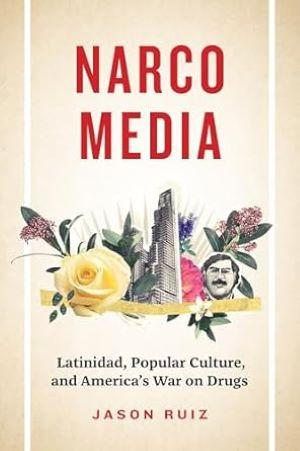Narco Media: Latinidad, Popular Culture, and America's War on Drugs by Jason Ruiz (2023, University of Texas Press, 248 pp., $29.95 PB)

In a fun and informative romp through these TV series and movies, Ruiz shows how, while many things have changed in popular culture representations of drug issues, at least one thing has remained stable: the portrayal of Latinos and Latin Americans as an alien force threatening the American body politic with dope. It seemed as if no episode of Miami Vice could be complete without a swarthy Latin villain, typically a drug lord wearing a white suit and with a penchant for homicidal violence.
Or in Breaking Bad, a critically lauded series about a white, middle-class teacher pushed by circumstance into meth production (who is portrayed sympathetically even as he transforms into the brutal drug kingpin Heisenberg), it is once again American Latinos and Mexicans who threaten our protagonists throughout. And Walter White/Heisenberg's competitor, "Chicken Man" Gus Fring, is Chilean.
Fring is also gay, a point made only very subtly in Breaking Bad, but one of interest to Ruiz, who, in a queer studies interlude examines the very limited portrayals of gayness in narco media. There is a recurring gay minor character in Miami Vice. Still, the more common response in the genre is to minimize it, as is the case with Colombian drug queen Griselda Blanco's lesbianism, which gets short shrift in Queen of the South, the USA Network series that ran from 2016 to 2021.
You can't talk about portrayals of the drug business in pop culture without talking about the most infamous drug kingpin of all, Pablo Escobar. He is, after all, the subject of the original Netflix series Narcos, Escobar: El Patron del Mal, Escobar: Paradise Lost, and Loving Pablo. Despite (or because of) his death at the hands of the Colombian state with the help of the gringos more than 30 years ago, the Colombian kingpin remains a source of cultural fascination. Ruiz calls him "the most alive dead man in the world."
Not only do the Escobar productions reproduce the stereotype of the violent Latin American drug lord, but they also typically follow storylines centered on white Americans. For instance, Narcos is narrated by characters based on real-life DEA agents. It seems to be an overarching feature of narco media that even though the subject matter is Latino or Latin American, whiteness is centered.
This book is a broad survey of narco media, touching on many more movies and TV series than I've managed to mention -- there are fascinating discussions of Weeds and Traffic, for instance -- but Ruiz returns time and again to his main point: Narco media reinforces narratives aimed at making white audiences comfortable, including comfortable with the drug war status quo, at least in part by making the Latino/Latin American Other the locus of the drug threat.
The serious messages notwithstanding, Narco Media is a gas to read, a fast-paced trip down memory lane with all those folks we love to hate and fear yet can't get enough of. Hello there, Tony Montana. How are you doing, Nancy Botwin? And Pablo -- how can we miss you if you won't go away?
This work by StoptheDrugWar.org is licensed under Creative Commons Attribution-ShareAlike 4.0 International
Add new comment